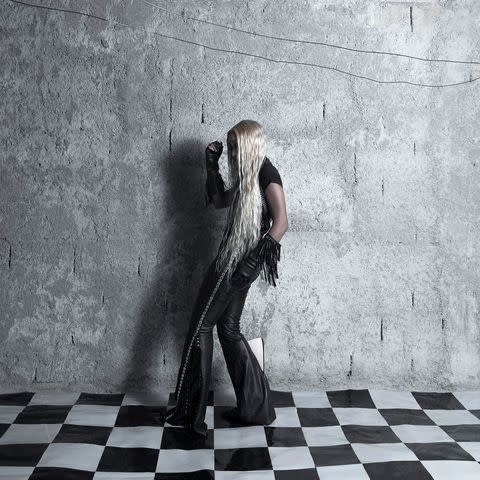Fousheé Talks “Pointy Heights” and Carrying on Family Legacy: 'It Changed My Perspective' (Exclusive)
The Grammy-winning singer-songwriter tells PEOPLE about her sophomore album and the illuminating trip to Jamaica that made it happen

Alondra Buccio
FousheéOn standout track “War” off her sophomore album Pointy Heights, Fousheé sings of a “life of harmony.” But what does the Grammy-winning singer-songwriter consider a harmonious life these days?
“Mental peace, optimism,” Fousheé tells PEOPLE.
“Accepting your world and your pace and what you have in front of you and being at peace with that. It's all about acceptance," she adds. "I think that's the root of happiness. And detachment. All these things, I think, make happiness.”
Now three projects into her discography and fresh off the release of Pointy Heights on Sept. 13, Fousheé has every reason to be radiating happiness — and pride — about her latest album while hopping on a Zoom call from Paris.
The album arrives four years after her viral hit “Deep End,” two after her contributions to Steve Lacy’s Grammy-winning Gemini Rights (including Hot 100 chart-topper “Bad Habit”) and it also marks her first project since 2022’s softCORE. Basically, things have only been progressing for Fousheé over the last four years of exploring her sound, as the music has now reached its latest form with Pointy Heights: a ska-and-reggae-laced ode to a feeling she was left with on another side of the world. And it's a tribute to home.
“It changed my perspective in that home can be a place that you haven't really spent much time,” she says of writing the album after an illuminating trip to visit family in Jamaica. “It's more about the people there and the relationships that you have. And it could be a new place, it could be a place that's always been a part of your life. And sometimes your actual home doesn't feel very homey.”

RCA Records
Fousheé's 'Pointy Heights'Born in New Jersey, Britanny Fousheé’s experience creating her new album can be attributed to another home in her life: Saint Catherine, Jamaica — the site of a mile-and-a-half stretch of land that her grandfather once purchased called Pointy Heights. While she personally never lived there growing up and only first visited at age 6, Pointy Heights now houses some of her extended family — many of whom joined her for some of the album’s visuals.
When making what would soon become Pointy Heights, Fousheé decided to take a trip to the album's eventual namesake for the first time since she was a child. That experience, she says, left her with “something I couldn't forget and I didn't want to forget.”
“I was like, ‘OK, I have to talk about this place. And how cool would it be to involve my family?’ Being in LA, and sitting with the experience, I went back very soon after, I think it was two weeks after,” Fousheé says. “I can’t stay away now.”
“It was just an overwhelmingly good feeling, a lot to process. Seeing the contrast of how I felt returning to my then home, versus how I felt in Jamaica, it was really refreshing."
Decades ago in Pointy Heights, Fousheé says her grandparents launched the Determined Youth Club in Bannister, a center for children to learn more about the arts and academics. These days, Fousheé now hopes the music that her trip inspired carries on something of a family tradition in the area. "I think with this album, it creates an opportunity to pass down that legacy. And I hope to do way more," she says. "I hope to maybe build back up a center there, or at least be a resource for everyone there.”
Never miss a story — sign up for PEOPLE's free daily newsletter to stay up-to-date on the best of what PEOPLE has to offer, from celebrity news to compelling human interest stories.
Fousheé, who admits her last album softCORE leaned punk while her project before (2021's Time Machine) aligned more with an "alternative soul" approach, says her latest direction on Pointy Heights can be attributed to a few things.
First, there’s her love of Bob Marley, to whom her mother introduced her as a young girl. Marley's music helped her feel a “confidence to perform" for the first time when she was home alone with her family as a kid, while his messaging connected with her on a deeper level, too. At one point during her chat with PEOPLE, Fousheé begins to cite lyrics from Marley's 1976 track "Who the Cap Fit": "Your worst enemy could be your best friend and your best friend could be your worst enemy."
“My artistry, I think, subconsciously reflects a lot of what Bob was as an artist or what I strive to be more so,” she says. “He wasn't that extravagant in the way that he dressed or how he would appear during performances. It was mostly about the storytelling. And he could just come in like a whole just denim outfit and with his hair and shake it around, and was impactful because of the values that he stood for.”
Pointy Heights also gets some of its flavor from the samples and interpolations that Fousheé helps sprinkle throughout from the worlds of reggae and soul. There’s the "Pass the Dutchie" interpolation on the Lacy-produced track “100 bux,” as well as a fresh spin on what she says is a reggae band covering Diana Ross’ 1979 track “It’s My House” on the album's opener “Birds, Bees.”

Scott Dudelson/Getty
Fousheé performs at Coachella in April 2023Creating the album itself also took a year, says Fousheé, whose previous work with Lacy on Gemini Rights taught her a lesson in taking time on her art. “Maybe with each record I'll take more and more time,” she says now. “But I feel that I just have a lot to say urgently right now in the state of the world now. Maybe later I can just take even more time. I get paranoid that I'm losing time sometimes. Really, I admire that. I admire giving it air and space and living in the music for a while before you put it out there. And then that way you can live with it forever.”
As for what she hopes her family in Jamaica can take away from Pointy Heights as an album, Fousheé reiterates that being in a "remote" area doesn’t minimize the impact they have. After all, her album is an ode to just that. “They can still be very much a part of the world and be a mouthpiece for the generations that have existed there," she says. "And so far, I think they feel that way. They feel very seen."
Pointy Heights is now available via RCA Records.
For more People news, make sure to sign up for our newsletter!
Read the original article on People.

 Yahoo Lifestyle
Yahoo Lifestyle 
